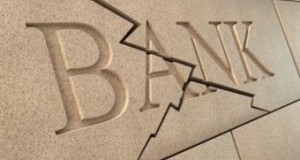Giving homeowners more reason to refinance their loans, third-quarter results show that a majority of borrowers who exchanged their fixed rates for today├â┬ó├óÔÇÜ┬¼├óÔÇ×┬ós low rates on first-lien mortgages either saved big on principal or kept their current payments. Of the 82 percent of borrowers who refinanced their first-lien mortgages, 37 percent of homeowners substantially reduced their principal balance by paying in. The GSE said 44 percent maintained their original monthly loan amounts by refinancing.
Read More »U.S. Lenders Wary Ahead of Euro Crisis: Survey
A third-quarter opinion survey for loan officers revealed that more financial institutions tightened their credit supply over fears that debt-ridden euro zone countries would tear apart the content├â┬ó├óÔÇÜ┬¼├óÔÇ×┬ós currency and expose U.S. banks to danger. The Federal Reserve polled senior loan officers from 51 U.S. banks and 22 branches for the nation├â┬ó├óÔÇÜ┬¼├óÔÇ×┬ós financial institutions at foreign branches for the October 2011 Senior Loan Officer Opinion Survey on Bank Lending Practices.
Read More »CFPB Rule Would Warn Offenders Before Enforcement Action
A new rule proposed by the Consumer Financial Protection Bureau could mean the difference between clemency and punitive measures for firms and financial institutions, which would receive two weeks' notice and the chance to explain their purported infractions before the bureau takes action. The so-called Early Warning Notice, published by the bureau in the Federal Register, would supply firms and institutions with cause for enforcement action and allow their counsel to submit a written rebuttal in defense.
Read More »Greek Turmoil, G-20 Decisions Target U.S. Lenders
Political trouble in Greece sent stocks and shares for major mortgage lenders tumbling Friday, even as the world's 20 wealthiest nations placed eight U.S. banks on a list that may require systemically risky institutions to shore up their capital reserves. The decision revealed the degree to which events overseas continue to shake U.S. mortgage lenders in an increasingly interdependent global economy, where international players fear the potential for a double-dip recession and ripple effects from systemically risky institutions.
Read More »Credit Unions Vie with Banks for Consumers, Mortgages
Rising debit card fees drove some 650,000 consumers to credit unions over October, with social media movements responsible for galvanizing the exodus, according to a recent survey. The Credit Union National Association laid claim to the figures in a survey for which the trade group polled some 5,000 credit unions nationwide. The ruckus over debit card fees began in September when the nation├â┬ó├óÔÇÜ┬¼├óÔÇ×┬ós largest lenders floated the idea of an increase in monthly payments for debit-card users. This only marks the latest in a string of public relations problems.
Read More »October Payrolls Add 80K, Chipping at Unemployment
Nonfarm payrolls counted more than 80,000 new jobs for the economy over October, slashing the unemployment rate by a few percentage points but at a clip that analysts say will marginally improve an otherwise uncertain economic outlook. The Labor Department reported Friday that the jump to more than 100,000 new jobs over September - a facelift driven largely by a return to work by striking Verizon employees - slid back to new figures with few surprising numbers for several industries.
Read More »HUD Scorecard Delivers Mixed Results for Housing
An October scorecard released Thursday by the Obama administration portrayed the housing market as one beset by mixed circumstances over September and the months before. A still-heavy foreclosure glut matched with declining home values and prices left the market slightly worse for the wear in some areas. The report measured up home prices, home sales, and refinance originations, finding declines for some and stabilization for others. A positive portrayal of efforts by the Obama administration also met with less favorable consumer sentiment.
Read More »Policymakers See GSE-Free Future as Freddie Asks for $6B
The head of the agency that regulates the GSEs addressed one lawmaker's recent proposal to eliminate the federal lifeline for Fannie Mae and Freddie Mac Thursday even as the latter filed staggering third-quarter losses and requested another $6 billion in taxpayer funds. Federal Housing Finance Agency Acting Director Edward DeMarco and several others testified before the House Subcommittee on Capital Markets, which heard the chief regulator describe why the federal government needs to slowly phase out taxpayer support for the GSEs.
Read More »Obama Officials Up the Ante to Get CFPB Director
Officials with the White House and Consumer Financial Protection Bureau continue to press critics of the bureau to confirm Richard Cordray as director, notably fronting the wife of Central Intelligence Agency Director Ret. Gen. David Petraeus Thursday. Speaking before the Senate Banking Committee, CFPB Assistant Director Holly Petraeus addressed concerns about the housing market and the effects on service members and their families, ascribing increased hardship to declining home values and difficulties in home sales.
Read More »Mortgage Rates Plunge Amid Euro Zone Trouble
After inching forward in the last few weeks, mortgage rates again plummeted on fresh concerns about the euro zone crisis, with rates dropping to 4.00 percent, the second-lowest reading for Freddie Mac. The GSE released a weekly survey alongside finance Web site Bankrate. Freddie reported the 30-year loan falling from 4.24 percent recorded last week, not a far cry from the 10-percentage point plunge to 4.23 percent from 4.33 percent that Bankrate.com recorded. Investor confidence shot up after Europe agreed to bail out Greece.
Read More » theMReport.com Your trusted source for mortgage banking news
theMReport.com Your trusted source for mortgage banking news









